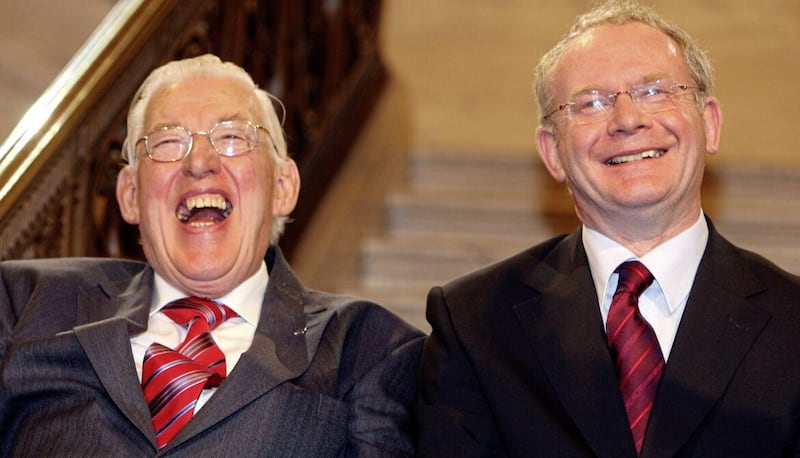At an event I was doing about four years ago, a member of the audience delivered what struck me as a very astute observation: “Unionists are determined to steer back to the future, while republicans are equally determined to roar forward to the past.”
What he meant by that is that republicanism/nationalism wanted to return to a time when Ireland was united – albeit not in the United Kingdom – while unionists wanted to return to a time when political/electoral/societal unionism was, to all intents and purposes, master of all it surveyed.
I think that what I’ll describe as a ‘harking back mentality’ is fairly typical in societies which remain conflicted. Let’s face it, the Good Friday Agreement delivered stalemate rather than resolution and that neither of the two main community blocs (with Alliance yet to confirm where it actually stands on the issue) will be uniformly happy with the aftermath of a border poll.
Indeed, the effort to accommodate unionism in the event of a Yes for Irish unity would also cause enormous problems for a significant swathe of republicanism/nationalism.
All that said, a valid point can be made about unionism’s seeming inability to think forward rather than seek solace in a past that an increasing number of them know nothing about other than though books and news footage.
No-one born after March 28 1972 will have lived under a unionist-only government. So, the past that some of their elders refer to is entirely alien to them. More important, it is a past which cannot now be reconstructed because the levels of demographic support no longer exist.
Yet there remains a tendency across unionism/loyalism/loyal orders to dwell on the good old days of majority rule, Westminster indifference and ‘united we stand, divided we fall’ strategizing.
But alongside that there is unambiguous evidence of forward thinking in some unionist circles. The numbers of former UUP voters and once non-voting unionists shifting to Alliance is evidence of it. As is a recognition in the leadership of both the UUP and DUP that unionism can only survive if the union survives; and that the union will only survive if the constitutional status quo carries the day in the border poll which I believe is inevitable.
Unionism has often shown itself capable of forward-thinking flexibility. In the 1969 ‘Crossroads’ election, Terence O’Neill tried to put his party on a new path. In 1973 the UUP, then under the leadership of Brian Faulkner, voted in favour of power-sharing with the SDLP and later that year Faulkner did cut the Sunningdale deal.
In 1975 Bill Craig, supported by a young David Trimble, broke the Vanguard Party apart over his support for power-sharing with the SDLP. In 1998 Trimble got the GFA across the line. And in 2007 Ian Paisley, steered by Peter Robinson, kept the show on the road by cutting a bespoke deal with Sinn Féin.

What has long bedevilled unionism, though, is the willingness of the centre to be dragged to the right by people who view flexibility as latter-day Lundyism.
I don’t regard Jim Allister as an extremist. I do, however, regard him as a purist: someone who believes that any stepping away from a political/constitutional ‘truth’ is, by its very action, a step towards surrender. It’s not that he’s stuck in the past; rather that the past is something he cannot see beyond.
My own view is that unionism is shifting towards the realisation that demographic and electoral change do, in fact, require a significant shift in long-term thinking.
That’s partly because it now finds itself a minority in the Assembly, House of Commons and local government. Crucially, though, it’s also the mounting post-Brexit evidence (although I would argue that the evidence has been building since the late 1960s) that no Westminster administration is ever going to permit, let alone underpin, a unionist strategy based on restoring the factory settings to some point in either 1955 (the year I was born) or 1962 (when the IRA border campaign collapsed in utter failure).
That wing of unionism accounted for just over 6% of the vote in July’s general election and delivered just one MP. The wing also accounts for one MLA out of 90 and 10 councillors out of 462. That wing of unionism is nowhere near the strength it had in 1998 (when it spanned the DUP, UKUP, elements of the UUP and Orange Order and a handful of independent MLAs and councillors) and it’s unlikely to grow.
The process of change across unionism has been desperately slow, but it has changed; and rustles in the undergrowth suggest it will continue to change.
Not as much nor as fast as I would like, but the change is happening.



